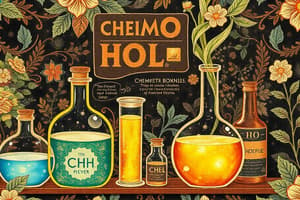Podcast
Questions and Answers
What defines a compound in terms of its elements?
What defines a compound in terms of its elements?
- Elements are purely isolated.
- Elements are chemically combined. (correct)
- Elements can be easily separated.
- Elements are physically combined.
Which of the following demonstrates a chemical property?
Which of the following demonstrates a chemical property?
- The hardness of diamond.
- Sodium reacting with chlorine gas. (correct)
- The density of gold.
- The melting point of sodium chloride.
What distinguishes the physical properties of a compound from its constituent elements?
What distinguishes the physical properties of a compound from its constituent elements?
- They are only similar in form but different in function.
- They are identical to the elements' properties.
- They are an average of the elements' properties.
- They are completely different from those of the elements. (correct)
Which statement is true regarding mixtures?
Which statement is true regarding mixtures?
How can hydrogen be produced from water?
How can hydrogen be produced from water?
What is a characteristic of a mixture?
What is a characteristic of a mixture?
Which of the following best describes air?
Which of the following best describes air?
Which of the following is not an example of a mixture?
Which of the following is not an example of a mixture?
What can mixtures contain?
What can mixtures contain?
In the context of mixtures, what is an example of a compound present in air?
In the context of mixtures, what is an example of a compound present in air?
Which statement accurately describes a mixture?
Which statement accurately describes a mixture?
What happens to the properties of components in a compound?
What happens to the properties of components in a compound?
Which of the following is true about iron sulfide?
Which of the following is true about iron sulfide?
What is a property of sulfur when burned in air?
What is a property of sulfur when burned in air?
How does iron differ from iron sulfide?
How does iron differ from iron sulfide?
What is a key characteristic of mixtures in terms of their components?
What is a key characteristic of mixtures in terms of their components?
How do compounds differ from mixtures regarding the combination of their components?
How do compounds differ from mixtures regarding the combination of their components?
Which statement about sodium chloride solutions is true?
Which statement about sodium chloride solutions is true?
Which of the following is true about the components in a mixture?
Which of the following is true about the components in a mixture?
An example of a mixture is formed when which substances are combined?
An example of a mixture is formed when which substances are combined?
What characterizes a homogeneous mixture?
What characterizes a homogeneous mixture?
Which of the following is an example of a heterogeneous mixture?
Which of the following is an example of a heterogeneous mixture?
In a heterogeneous mixture, how are the components characterized?
In a heterogeneous mixture, how are the components characterized?
What happens to suspended materials in a stable mixture like orange juice over time?
What happens to suspended materials in a stable mixture like orange juice over time?
Which mixture can be described as having only one phase?
Which mixture can be described as having only one phase?
Flashcards are hidden until you start studying
Study Notes
Compounds
- Elements in a compound are chemically combined; conversion to elements requires chemical reactions.
- Water can yield hydrogen via reaction with sodium or through electrolysis.
- Compounds exhibit unique physical and chemical properties distinct from their elemental components.
- Example: Water, a liquid, is formed from hydrogen (explosive gas) and oxygen (highly reactive gas).
Chemical and Physical Properties
- Chemical Properties: Describe substance behavior during chemical reactions.
- Physical Properties: Include attributes such as melting point, density, hardness, and electrical conductivity.
- Example: Sodium chloride (table salt) is formed from sodium (reactive metal) and chlorine (toxic gas) but has very different reactions compared to its elemental components.
Mixtures
- Mixtures consist of pure substances like elements and compounds, but most materials are mixtures.
- Air is a common mixture, primarily composed of nitrogen, oxygen, and argon along with compounds such as carbon dioxide and water vapor.
- Blood serves as a mixture transporting oxygen throughout the body.
- Mixtures maintain individual properties as components are not chemically bonded.
Types of Mixtures
- Homogeneous Mixtures: Uniform composition throughout with only one phase, like solutions and gas mixtures.
- Heterogeneous Mixtures: Non-uniform composition with distinct boundaries between phases, e.g., sand in water, milk, and orange juice.
Additional Key Points
- Compounds consist of components that lose their individual properties to form new materials.
- Example of a compound: Iron sulfide, which is not magnetic and reacts to form toxic hydrogen sulfide gas.
- Mixtures can be created in any proportion, unlike fixed ratios in compounds.
- Solutions demonstrate uniform concentration throughout—any sample would yield the same mass upon evaporation.
- Distinct phases in heterogeneous mixtures can settle, as evident in orange juice with suspended materials.
Studying That Suits You
Use AI to generate personalized quizzes and flashcards to suit your learning preferences.




